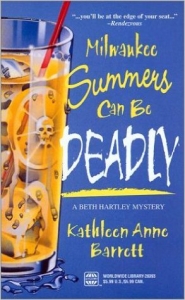 Never Choose a Book Based on its Cover
Never Choose a Book Based on its Cover
Author: Kathleen Anne Barret
I’m a sucker for a sale, especially when that sale involves a box filled with assorted cozy mysteries. Purchased after a bidding war on eBay, I now have bursting boxes filled with brightly colored and broken paperbacks – something I justify on a daily basis as an inexpensive way to discover new authors and cozy series. Delving my hand into the pile without reading the back cover blurb or researching the author and work on Amazon, I came out with Milwaukee Summers Can be Deadly and decided to add it to my reading list based on the bright colors and suitable kitschy cozy atmosphere of the grinning skulls suspended in a sweating glass of lemonade. Months later, long torturous months, I finally finished this . . . experience . . . and am now keeping my hand out of the way of that eBay box. I’m . . . I’m just not ready to do that again. I’m not that brave.
The story starts as it means to go on, introducing ex-attorney turned legal researcher Beth Hartley as a young neighborhood boy begs her to investigate his father’s murder. Philip Barry (who incidentally has a brother named Gerry Barry – someone loved their rhyming) was a womanizing CPA with a penchant for making enemies. Beth had success researching one murder previously (this is apparently the second in the series), and she willingly agrees. The first chapter promises readers a groan worthy read complete with stilted, unrealistic interactions and a Beaver Cleaver approach to investigation. The emotion behind the request and inherent in the acceptance is both over and underdone, an accomplishment of truly dull writing.
And thus begins what I like to call arm-chair investigation. Having promised Pete (i.e. the young boy), Beth proceeds to call various people on the phone, introducing the fact that she is investigating in no official capacity, using the “get out of jail free” excuse of helping a kid (which seems to get to these people), and then asks to speak to Phil’s closest family, friends, and business associates. They are each reluctant, bad tempered, and then after a certain amount of passive-aggressive bitching, allow Beth to come to their homes for some murder chat.
We get numerous descriptions of the interviewee’s clothes, home, the trees in his/her yard, the forks in his/her their kitchen, the brand of coffee creamer in the cupboard, the fluffiness of the clouds in the sky, ad nauseaum. When the fluff runs out of direction, Beth asks a few evident questions (“did you murder him;” “who do you think killed him;” “did the killer by any chance tell you all of their plans and schemes;” “do you have the murder plot written down on a piece of paper because I am running out of red herrings to distract my snoozing readers…” Ah, sorry, drifted off there. Get the idea?
At this juncture, despite being an avid reader finishing anywhere from four to ten novels a week, I found myself lagging and turning pages back, trying to recall the names of both the victim and the investigator. Not a good sign. Having finished Milwaukee Summers less than a week ago, I’m tugging out wodges of hair, trying to remember who the killer was and why he/she offed the sultry CPA. I recall being underwhelmed.
Incidentally, no, I never discovered what the mystery had to do with Milwaukee. I suppose it was set there, but atmosphere and place were hardly central here, despite the over description of inane details.
This is the point in the review (I recognize it, because I always get tired and apathetic here) where I discuss characterization, writing style, and plot. I’m at a loss. I forget the characters, many times before even finishing the chapter I was actively reading. The writing was merely an outline, emotionless and bare, as though sketching possibilities for a future novel/story that wasn’t written. The plot? Ummm, was there one? A plot would indicate a sense of progression, tension, forward momentum, investigate, a clear reason why Beth is investigating and why we have a murdered CPA. The struggle is real. You can feel the author trying, pushing and kneading scenes that cost sweat and blood to get onto the page, trying to discover where this story intends to go. In the conclusion, the effort is wasted, and the novel sighs in relief. It quits seeking the muse and relishes the giving up, having pushed that boulder half way up the mountain and accepting the moment of inevitable fate where strength fails and there is quiet before crushing, life ending weight. Not recommended.
- Frances Carden
- Book Vs Movie: The Shining - April 6, 2020
- Thankful For Great Cozy Mysteries - December 13, 2019
- Cozy Mysteries for a Perfect Fall - October 20, 2019



Leave A Comment